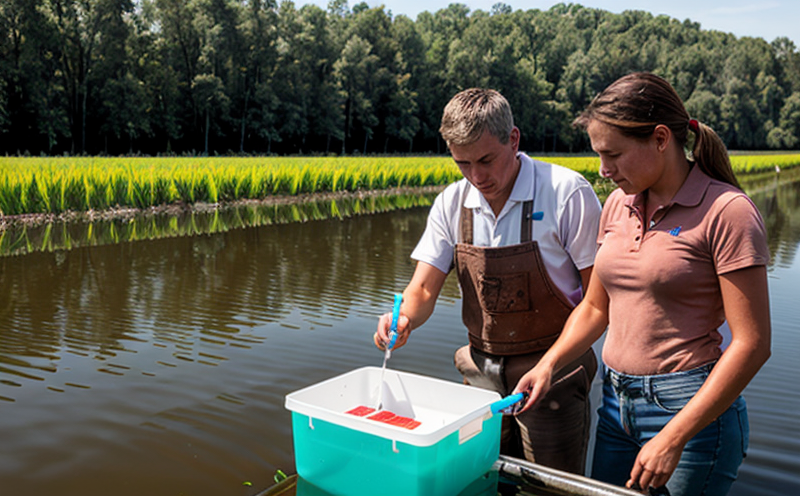Fluoride Content Testing in Irrigation Water
The quality of irrigation water is critical to agricultural productivity and sustainability. Fluoride content testing plays a pivotal role in ensuring that the water used for irrigation does not contain levels of fluoride that could be harmful to crops, livestock, and human health.
Fluoride is an essential nutrient at low concentrations but can become toxic if present in high amounts. In agriculture, excessive fluoride can lead to reduced crop yields, stunted plant growth, and increased susceptibility to diseases. Furthermore, livestock consuming water with high fluoride levels may suffer from fluorosis, a condition characterized by skeletal and dental disorders.
Water sources used for irrigation often vary widely in their chemical composition due to natural geological processes or anthropogenic activities such as industrial discharge and waste management practices. Therefore, it is imperative to conduct thorough testing of these water sources before they are utilized for agricultural purposes.
Eurolab uses advanced analytical techniques including ion chromatography and atomic absorption spectrophotometry (AAS) to measure fluoride concentrations in irrigation water samples accurately. These methods ensure precise and reliable results that comply with international standards like ISO 17294:2013 for the determination of fluoride in water by ion chromatography.
Proper sample preparation is crucial when testing fluoride content. Samples must be collected from representative locations within the irrigation system to avoid sampling bias and ensure accurate representation of overall quality parameters. Once collected, samples need to be stored under appropriate conditions until they are analyzed at our laboratory.
The process begins with thorough rinsing of collection containers using distilled water to eliminate any potential contamination. Next, the actual sample is transferred into clean containers made specifically for fluoride analysis and sealed tightly to prevent exposure to air, which can affect the results significantly.
Analysis involves several steps including digestion if necessary, followed by measurement via ion chromatography or atomic absorption spectrophotometry depending on the expected fluoride concentration. After completing these analyses, Eurolab prepares detailed reports specifying the exact amount of fluoride found in parts per million (ppm).
These findings help stakeholders make informed decisions about how best to manage their water resources sustainably while minimizing risks associated with excessive fluoride levels.
Why It Matters
Ensuring optimal fluoride content in irrigation water contributes directly to maintaining soil health and promoting robust plant growth. Excessive fluoride can disrupt the physiological functions of plants, leading to reduced yields and quality issues. By conducting regular fluoride tests, farmers can identify potential problems early on, allowing them to take corrective actions promptly.
From an environmental perspective, accurate fluoride content testing also helps prevent contamination of nearby water bodies through runoff from agricultural lands. This not only protects aquatic ecosystems but also ensures compliance with regulatory requirements set forth by governmental agencies responsible for safeguarding public health and natural resources.
Moreover, monitoring fluoride levels in irrigation water enables better management practices regarding the selection of appropriate crops based on their tolerance thresholds towards fluoride concentrations. For instance, some species like rice are more susceptible to fluoride toxicity compared to others such as wheat or maize. Thus, understanding fluoride content allows farmers to choose suitable crops for specific fields, optimizing resource utilization and enhancing overall efficiency.
Eurolab Advantages
Eurolab prides itself on offering comprehensive services tailored specifically for the agricultural sector. Our team of experts combines extensive experience with cutting-edge technology to provide clients with reliable, accurate results that meet stringent quality control standards.
We employ state-of-the-art equipment such as ion chromatographs and atomic absorption spectrophotometers designed explicitly for fluoride analysis. These instruments offer high precision and accuracy, ensuring consistent reproducibility across multiple analyses performed by our staff members.
In addition to advanced instrumentation, Eurolab maintains strict quality assurance protocols throughout the entire testing process—from sample collection through final report generation. Our ISO/IEC 17025 accreditation guarantees adherence to international best practices recognized globally within the scientific community.
Our commitment extends beyond mere compliance; we strive continuously to innovate and improve our methods based on emerging research findings in this field. By staying ahead of industry trends, Eurolab ensures that clients receive up-to-date information regarding optimal fluoride content levels for various crops under different environmental conditions.
Quality and Reliability Assurance
Eurolab adheres rigorously to ISO/IEC 17025:2017 standards, ensuring that all tests conducted meet the highest levels of accuracy and precision. Our laboratories are equipped with modern instrumentation capable of detecting minute quantities of fluoride even when present at very low concentrations.
We follow strict procedures for sample handling, storage, transportation, and analysis to minimize any possible sources of error or bias. Each step in this process is meticulously documented to provide transparency and traceability throughout the testing cycle.
Our trained personnel possess extensive knowledge about various aspects related to fluoride content assessment, including understanding local geology and hydrology patterns influencing fluoride distribution in different regions. This expertise enables us to offer valuable insights beyond just providing numerical data points.
In addition to internal quality checks performed by our team members, Eurolab also participates actively in proficiency testing programs organized by recognized bodies worldwide. These exercises further validate the reliability and consistency of our analytical results against those obtained by other reputable laboratories around the globe.





